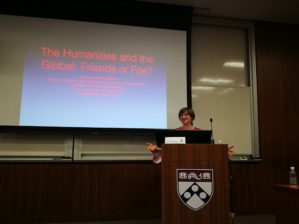
July 24, 2018
Beijing, June 20th, 2018 – The 21st century has seen the creation of new linkages across the globe at an unparalleled rate. Never before has it been so possible for people, goods, services, and ideas to move from one place to another. Yet this increasingly connected world provides challenges as well as opportunities that today’s global citizens must confront. How might we best navigate our own connected world?
Now, more than ever, the importance of involving diverse voices from humanities fields is key to bringing a sustainable, relevant, and historically- and culturally-informed approach to higher education’s engagement with “the global.” While a conversation around “the global” should ideally include attention to diverse languages, traditions, cultures, and histories across the globe, Elliot and Roslyn Jaffe Professor Karen Redrobe, Director of the Wolf Humanities Center and Chair of the Department of History of Art at Penn, suggests that humanists often criticize such conversations as tending to suppress divergent approaches and to favor Anglo-American voices and worldviews. As she introduced the discussion topic, “The Humanities and the Global: Friends or Foe?,” she stressed the importance of seeking for truth, however complex, through evidence-based and historically-informed research; of learning languages; cultivating multi-directional translation programs; and of including to participants from diverse places, cultures, and backgrounds in academic discussions of our interconnected world so that the richness and insights of the past can guide contemporary conversations about how we understand our present and predict our futures.
Prof. Redrobe’s presentation served as a prologue to a lecture by Prof. Paul Cobb, a medieval historian of the Islamic world and Chair of the Department of Near Eastern Languages and Civilizations at the University of Pennsylvania. At a moment when Penn has just launched a new minor in Global Medieval Studies, Cobb, a leading scholar in his field, presented a historical view of how learning occurs through travel and international partnerships. How, he asked, did people of the medieval world navigate the challenges and opportunities across Eurasia? What lessons can the Global Middle Ages offer us today in our own inter-connected world?
The lecture distilled the writings of hundreds of medieval travelers–Europeans, Africans, and Asians, of different religions and different backgrounds–to offer a handful of lessons drawn from their itinerant experiences. These medieval lessons demonstrated a mixture of the strange and the shockingly familiar, including: the importance of formal education; the value of open-mindedness; the strength of personal and informal relationships; the crucial need for adaptability; and–equally important–the central role of food (“Bring snacks!”). By vividly depicting through a historical lens the challenges, opportunities and pleasures of cross-cultural encounters in a way that is deeply relevant to our contemporary world, Professor Cobb celebrated and examined our shared human experiences across time and across continents.

Addressing the challenges the interconnected world presents to us, Prof. Cobb used the example of the development of new global economies and the re-emergence of historically-rich power centers in Central Asia and China. “Making all this possible is a new infrastructure of communication and transport across Eurasia,” Cobb suggested, going on to include a number of transport infrastructure examples growing rapidly across Eurasia, and most notably, China’s Belt and Road Initiative. This interconnectivity has enabled not just new types of wealth but also new centers of knowledge, through China’s Confucius Institutes, for exchange, as well as the emergence of American Research University campuses and programs that serve as hubs for education and the exchange of ideas in the region.
As interconnectivity grows rapidly, Prof. Cobb highlighted the importance of humanities scholars working with other disciplines toward goals that are often unquantifiable in their benefits, together “exploring the vast world of human experience, past and present; observing other people and other cultures overcome challenges that are analogous to our own; and learning new ways to observe and hopefully new ways to think.”
Using the example of the Crusades, on which he is one of the leading voices, Prof. Cobb pointed out how we can learn from the medieval world, a world that was, like ours, interconnected across diverse religions and ethnicities. Through his teaching and research, Cobb argues for the benefits of a shift in perspective: for example by telling the history of the Crusades from the perspective of the crusaded, rather than that of the crusaders. He shows how altering one’s lens on this and other historical moments can illuminate aspects of experience hidden by other approaches. Offering new histories through new perspectives like this is just one way of helping us enrich our understanding of the “phenomenon of interconnectivity in our world.”
“The Penn Wharton China Center is a testament of the interconnectivity that’s reshaping our world”, Prof. Cobb stated.

